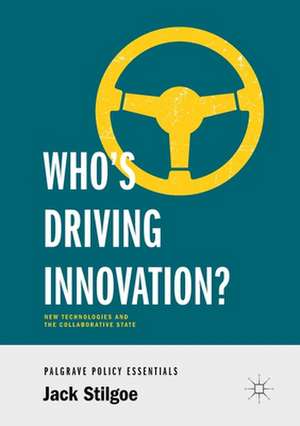Who’s Driving Innovation?: New Technologies and the Collaborative State
Autor Jack Stilgoeen Limba Engleză Paperback – 3 dec 2019
"A much needed, sobering look at the seductive promises of new technologies. You couldn’t ask for a better guide than Jack Stilgoe. His book is measured, fair and incisive.”
Hannah Fry, University College London, UK, and author of Hello World: How to be Human in the Age of the Machine
“A cracking and insightful little book that thoughtfully examines the most important political and social question we face: how to define and meaningfully control the technologies that are starting to run our lives.”
Jamie Bartlett, author of The People vs Tech: How the Internet is Killing Democracy (and How We Save It)
"Innovation has not only a rate but also a direction. Stilgoe’s excellent new book tackles the directionality of AI with a strong call to action. The book critiques the idea that technology is a pre-determined force, and puts forward a concrete proposal on how to make sure we are making decisions along the way that ask who is benefitting and how can we open the possibilities of innovation while steering them to deliver social benefit."
Mariana Mazzucato, University College London, UK, and author of The Value of Everything: Making and Taking in the Global Economy
“Looking closely at the prospects and problems for ‘autonomous vehicles,’ Jack Stilgoe uncovers layer after layer of an even more fascinating story - the bizarre disconnect between technological means and basic human ends in our time. A tour de force of history and theory, the book is rich in substance, unsettling in its questions and great fun to read.”
Langdon Winner, Rensselaer Polytechnic Institute, USA
Too often, we understand the effects of technological change only in hindsight. When technologies are new, it is not clear where they are taking us or who's driving. Innovators tend to accentuate the benefits rather than risks or other injustices. Technologies like self-driving cars are not as inevitable as the hype would suggest. If we want to realise the opportunities, spread the benefits to people who normally lose out and manage the risks, Silicon Valley’s disruptive innovation is a bad model. Steering innovation in the public interest means finding new ways for public and private sector organisations to collaborate.
Preț: 124.09 lei
Nou
Puncte Express: 186
Preț estimativ în valută:
23.75€ • 24.70$ • 19.61£
23.75€ • 24.70$ • 19.61£
Carte disponibilă
Livrare economică 25 martie-08 aprilie
Preluare comenzi: 021 569.72.76
Specificații
ISBN-13: 9783030323196
ISBN-10: 3030323196
Pagini: 74
Ilustrații: VII, 74 p. 1 illus.
Dimensiuni: 148 x 210 x 6 mm
Greutate: 0.12 kg
Ediția:1st ed. 2020
Editura: Springer International Publishing
Colecția Palgrave Macmillan
Locul publicării:Cham, Switzerland
ISBN-10: 3030323196
Pagini: 74
Ilustrații: VII, 74 p. 1 illus.
Dimensiuni: 148 x 210 x 6 mm
Greutate: 0.12 kg
Ediția:1st ed. 2020
Editura: Springer International Publishing
Colecția Palgrave Macmillan
Locul publicării:Cham, Switzerland
Cuprins
1. Prologue: Who killed Elaine Herzberg?.- 2. Innovation is not self-driving.- 3. The politics of tech.- 4. In dreams begins responsibility.- 5. The Collaborative State.
Recenzii
“The insights presented by Stilgoe will be familiar for most scholars of innovation, but the book compiles these insights in an elegant and compelling manner. As such, it seems especially useful for educational purposes. However, I think the book also presents some highly relevant lessons for ethicists of technology.” (Udo Pesch, Science and Engineering Ethics, Vol. 27 (3), June, 2021)
Notă biografică
Jack Stilgoe is an Associate Professor of science and technology studies at University College London, UK. He specialises in the governance of emerging technologies. On Twitter, he is @jackstilgoe.
Textul de pe ultima copertă
"A much needed, sobering look at the seductive promises of new technologies. You couldn’t ask for a better guide than Jack Stilgoe. His book is measured, fair and incisive.”
Hannah Fry, University College London, UK, and author of Hello World: How to be Human in the Age of the Machine
“A cracking and insightful little book that thoughtfully examines the most important political and social question we face: how to define and meaningfully control the technologies that are starting to run our lives.”
Jamie Bartlett, author of The People vs Tech: How the Internet is Killing Democracy (and How We Save It)"Innovation has not only a rate but also a direction. Stilgoe’s excellent new book tackles the directionality of AI with a strong call to action. The book critiques the idea that technology is a pre-determined force, and puts forward a concrete proposal on how to make sure we are making decisions alongthe way that ask who is benefitting and how can we open the possibilities of innovation while steering them to deliver social benefit."
Mariana Mazzucato, University College London, UK, and author of The Value of Everything: Making and Taking in the Global Economy
“Looking closely at the prospects and problems for ‘autonomous vehicles,’ Jack Stilgoe uncovers layer after layer of an even more fascinating story - the bizarre disconnect between technological means and basic human ends in our time. A tour de force of history and theory, the book is rich in substance, unsettling in its questions and great fun to read.”
Langdon Winner, Rensselaer Polytechnic Institute, USA
Jack Stilgoe teaches science and technology studies at University College London. He specialises in the governance of emerging technologies. On Twitter, he is @jackstilgoe.
Caracteristici
Palgrave Policy Essentials are short books on a range of policy-relevant subjects, written in an accessible style. Authored by the lead on the Royal Society's study that produced the influential report, The Scientific Century Argues that governing technology means looking at its political economy. Summarises the ideas that should inform policy approaches to new technologies, including self-driving cars
